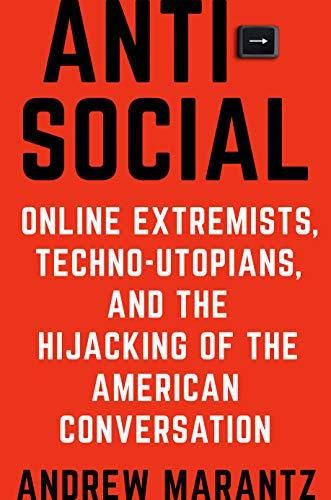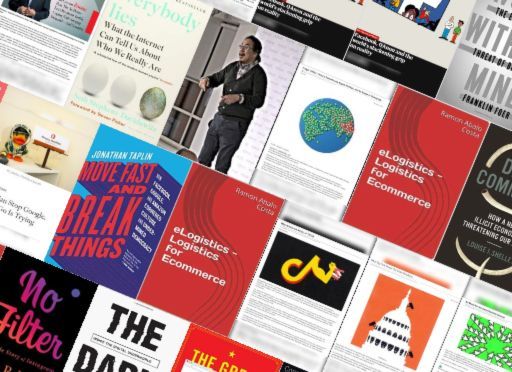New Yorker staff writer Andrew Marantz explores the impact that an untruthful, unfettered, hate-filled online world has on American democracy and discourse.

The Death of Discourse
New Yorker staff writer Andrew Marantz writes extensively about technology, social media, the alt-right and the press. His insights into American social media patterns and politics have garnered only positive reviews. For example, The New York Times named Antisocial among its Notable Books for 2019, and the prestigious New York Review of Books named it an Editor’s Choice. Vogue got right to the point by calling it “devastatingly relevant.”
The United States has always been an iconoclastic, anti-authoritarian country, Marantz writes. Early in the 21st century, idealistic computer programmers created “social media.” They believed, the author reminds readers, that social media would connect diverse people and increase society’s well-being. Instead, people use social media to disseminate misinformation and hate, thus transforming the American conversation in awful and shocking ways. Marantz doesn’t mind being controversial, so you know he gets around to President Trump.
The National Conversation
The US Constitution guarantees free speech, especially, Marantz emphasizes, if that speech comes from a small, marginalized minority.
Then, swiftly, came the unthinkable: smart, well-meaning people unable to distinguish simple truth from viral misinformation; a pop-culture punch line ascending to the presidency; neo-Nazis marching unmasked through several American cities.Andrew Marantz
Marantz makes the case that social media disrupters resisted becoming gatekeepers, but – since social media has no legacy gatekeepers – this left the gates open.And that changed the national conversation. The author limns a crucial theme: The “great American consensus” vanished.
People prospered by fomenting hate to generate large followings on social media platforms. Nobody cared about improving the country or the world. Marantz concludes that these posters sought only to inflame division. He has little respect for social media founders who justified those who disseminate damaging lies and hatred by citing the right to free speech.
“Gatekeeper” Algorithms
Marantz explains that as technology companies grow, they gather increasing data about their users. They refine algorithms, and subject people to “microtargeting.” “Personalized filters” rank items by the size of the response they garner. Marantz feels strongly that this undermines democratic values.
Marantz makes it clear that Facebook’s purpose is not to disseminate valuable ideas, but to keep people tied to Facebook, to make sure they keep coming back. Computer algorithms, Marantz shows, promote only information which provokes a strong response. The author presents the problem succinctly: If information doesn’t garner a sufficient audience, algorithms drive it into oblivion.
“Dose Politics“
Emerson Spartz made money by making websites teenagers loved. Marantz characterizes Spartz as believing that the only measure of something’s worth was whether people shared it. The nature of the site didn’t matter to him. Going viral mattered.
Marantz details Spartz’s tactics. His aggregating site, Dose, floats multiple versions of each post’s headline and an algorithm tells Spartz how quickly each post is drawing attention. Spartz applied the same techniques to his Dose Politics site to test which political news headlines was most likely to go viral. Marantz makes it clear that Spartz didn’t bring Donald Trump into power. But, in the author’s analysis, Spartz’s tactics made Trump’s rise to power possible.
In the early 21st century, the internet moved from the “open web” to the “social web.” If large companies and institutions controlled the first iteration of the internet, Marantz maintains, ordinary people dominated the social web.
The author asserts that, in the beginning, Reddit had few regulations about what people could or couldn’t post. The founders opposed controls on the movement of information. Marantz reports that Reddit’s voting system emphasized and promoted quality. He surprisingly holds that Reddit improved access to information by democratizing it.
Awareness Is Power
Marantz reports that Twitter was supposed to reflect people’s emotional involvement with ideas. But, he reveals, it exaggerates conflict, which makes it easier to fabricate information and amplify scandals.
In a world of trending topics and algorithmic feedback loops, equal representation isn’t just impossible; its not even the goal.Andrew Marantz
Although social media gives people on the margins a venue, Marantz holds that it doesn’t open its doors with equality. He offers a simple and profound explanation: the algorithms that drive social media don’t prioritize equality and fairness.
All Attention Is Good
Marantz regards Donald Trump as the ultimate “media troll” – a man with a ruthless, wily understanding of how to make the media bend to him. Marantz suggests that Trump assumes all media attention is good; that the random assertion of authority makes him appear strong; and that attacking the legitimacy of the press lets him lie freely.
[Trump] had such a limited rhetorical toolkit – a meager lexicon, a warped memory, a weirdly specific kind of monotonal charisma – and yet, with those rudimentary implements, he was able to do so much. Andrew Marantz
Trump, Marantz recognizes, treated press conferences like stadium concerts. Journalists asked relevant questions and called out Trump’s lies while participating in their own humiliation, live on social and broadcast media. Marantz deconstructs Trump’s tactics, and shows why they are effective, but he clearly finds Trump’s objectives contemptible.
Marantz reports that those who disseminate hate and disruption cover themselves in the blanket use of “free-speech absolutism” and then malign tech leaders for banishing them when they incite violence, express prejudice or lie. Marantz encourages Americans to find a new way of communicating about ethical and political issues. The author asserts that society doesn’t change on its own. People change it.
Reportage, Observation, Insights
In his elegant, smooth prose, Marantz offers objective reporting of facts, insightful presentations of ongoing social dynamics and purely editorial comments on what he sees as forces accelerating the degeneration of American culture, community and discourse. He doesn’t take ideological positions, exactly, though alt-right hatemongers will disagree with everything he says and those who support Trump at his most disruptive will dislike the author’s characterizations. Marantz will fascinate, engage and entertain anyone concerned with the future of the ongoing American experiment as seen through – and affected by – the prism of social media.






